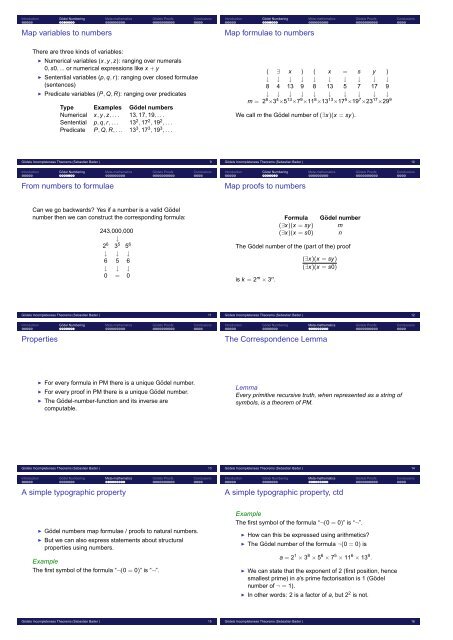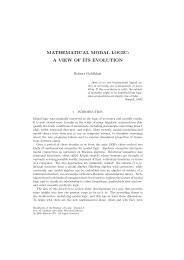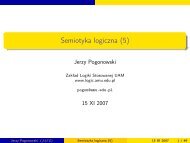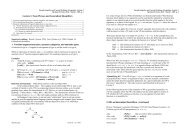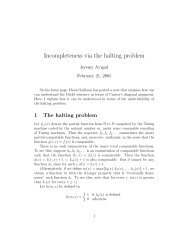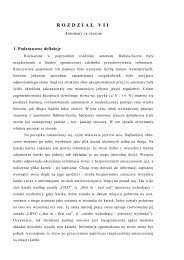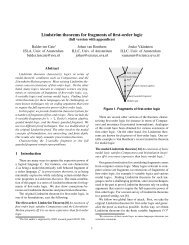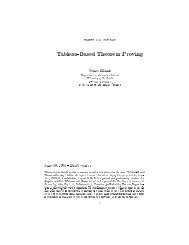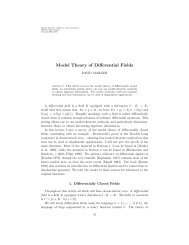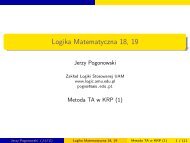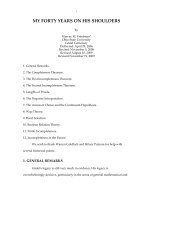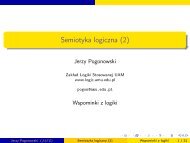Gödels Incompleteness Theorems Kurt Gödel His Theorems A ...
Gödels Incompleteness Theorems Kurt Gödel His Theorems A ...
Gödels Incompleteness Theorems Kurt Gödel His Theorems A ...
You also want an ePaper? Increase the reach of your titles
YUMPU automatically turns print PDFs into web optimized ePapers that Google loves.
Introduction Gödel Numbering Meta-mathematics Gödels Proofs Conclusions<br />
Map variables to numbers<br />
Introduction Gödel Numbering Meta-mathematics Gödels Proofs Conclusions<br />
Map formulae to numbers<br />
There are three kinds of variables:<br />
◮ Numerical variables (x, y, z): ranging over numerals<br />
0, s0, ... or numerical expressions like x + y<br />
◮ Sentential variables (p, q, r): ranging over closed formulae<br />
(sentences)<br />
◮ Predicate variables (P, Q, R): ranging over predicates<br />
Type Examples Gödel numbers<br />
Numerical x, y, z, . . . 13, 17, 19, . . .<br />
Sentential p, q, r, . . . 13 2 , 17 2 , 19 2 , . . .<br />
Predicate P, Q, R, . . . 13 3 , 17 3 , 19 3 , . . .<br />
( ∃ x ) ( x = s y )<br />
↓ ↓ ↓ ↓ ↓ ↓ ↓ ↓ ↓ ↓<br />
8 4 13 9 8 13 5 7 17 9<br />
↓ ↓ ↓ ↓ ↓ ↓ ↓ ↓ ↓ ↓<br />
m = 2 8 ×3 4 ×5 13 ×7 9 ×11 8 ×13 13 ×17 5 ×19 7 ×23 17 ×29 9<br />
We call m the Gödel number of (∃x)(x = sy).<br />
Gödels <strong>Incompleteness</strong> <strong>Theorems</strong> (Sebastian Bader ) 9<br />
Introduction Gödel Numbering Meta-mathematics Gödels Proofs Conclusions<br />
From numbers to formulae<br />
Gödels <strong>Incompleteness</strong> <strong>Theorems</strong> (Sebastian Bader ) 10<br />
Introduction Gödel Numbering Meta-mathematics Gödels Proofs Conclusions<br />
Map proofs to numbers<br />
Can we go backwards? Yes if a number is a valid Gödel<br />
number then we can construct the corresponding formula:<br />
243,000,000<br />
↓<br />
2 6 3 5 5 6<br />
↓ ↓ ↓<br />
6 5 6<br />
↓ ↓ ↓<br />
0 = 0<br />
Formula<br />
(∃x)(x = sy)<br />
(∃x)(x = s0)<br />
Gödel number<br />
m<br />
n<br />
The Gödel number of the (part of the) proof<br />
is k = 2 m × 3 n .<br />
(∃x)(x = sy)<br />
(∃x)(x = s0)<br />
Gödels <strong>Incompleteness</strong> <strong>Theorems</strong> (Sebastian Bader ) 11<br />
Introduction Gödel Numbering Meta-mathematics Gödels Proofs Conclusions<br />
Properties<br />
Gödels <strong>Incompleteness</strong> <strong>Theorems</strong> (Sebastian Bader ) 12<br />
Introduction Gödel Numbering Meta-mathematics Gödels Proofs Conclusions<br />
The Correspondence Lemma<br />
◮ For every formula in PM there is a unique Gödel number.<br />
◮ For every proof in PM there is a unique Gödel number.<br />
◮ The Gödel-number-function and its inverse are<br />
computable.<br />
Lemma<br />
Every primitive recursive truth, when represented as a string of<br />
symbols, is a theorem of PM.<br />
Gödels <strong>Incompleteness</strong> <strong>Theorems</strong> (Sebastian Bader ) 13<br />
Introduction Gödel Numbering Meta-mathematics Gödels Proofs Conclusions<br />
A simple typographic property<br />
Gödels <strong>Incompleteness</strong> <strong>Theorems</strong> (Sebastian Bader ) 14<br />
Introduction Gödel Numbering Meta-mathematics Gödels Proofs Conclusions<br />
A simple typographic property, ctd<br />
◮ Gödel numbers map formulae / proofs to natural numbers.<br />
◮ But we can also express statements about structural<br />
properties using numbers.<br />
Example<br />
The first symbol of the formula “¬(0 = 0)” is “¬”.<br />
Example<br />
The first symbol of the formula “¬(0 = 0)” is “¬”.<br />
◮ How can this be expressed using arithmetics?<br />
◮ The Gödel number of the formula ¬(0 = 0) is<br />
a = 2 1 × 3 8 × 5 6 × 7 5 × 11 6 × 13 9 .<br />
◮ We can state that the exponent of 2 (first position, hence<br />
smallest prime) in a’s prime factorisation is 1 (Gödel<br />
number of ¬ = 1).<br />
◮ In other words: 2 is a factor of a, but 2 2 is not.<br />
Gödels <strong>Incompleteness</strong> <strong>Theorems</strong> (Sebastian Bader ) 15<br />
Gödels <strong>Incompleteness</strong> <strong>Theorems</strong> (Sebastian Bader ) 16


